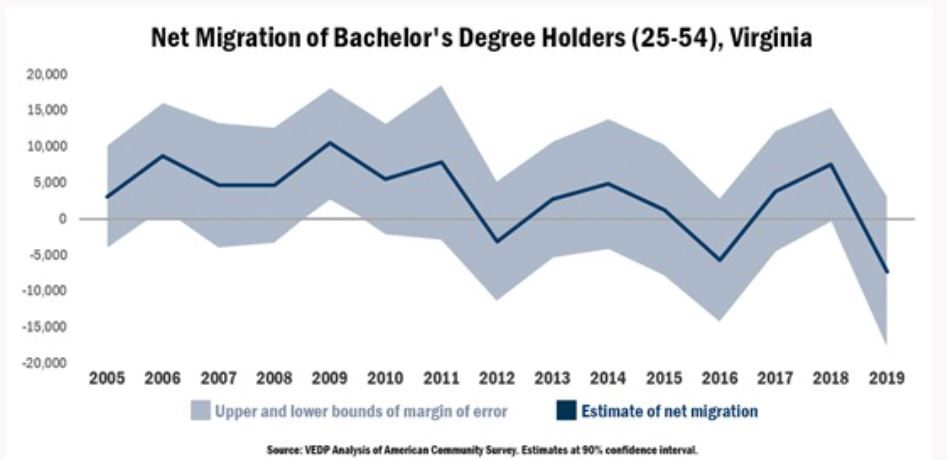
by James A. Bacon
Researchers at the State Council of Higher Education for Virginia (SCHEV) are asking a question with profound implications for Virginia’s higher-education policy. Is Virginia exporting more college graduates than it is importing?
The answer, conclude Tom Allison & Susan Hankins in the latest Insights post, is, “Maybe. Enough to get our attention.”
The issue is politically sensitive because SCHEV has declared as a matter of state policy the goal of making Virginia the “best educated state in the country” by 2030. That goal makes eminent sense if demand exists for students with advanced degrees, especially STEM degrees. But if the demand doesn’t exist for all the credentialed young people churned out by Virginia’s colleges and universities, and if graduates migrate to states with more job opportunities, then Virginia winds up subsidizing human capital development for other states.
Once upon a time, when the Old Dominion had a more dynamic economy, Virginia sucked up credentialed people educated in other states at other states’ expense. But in the past decade, Virginia has seen more out-migration of taxpaying citizens (whose addresses are tracked by the Internal Revenue Service), than in-migration. Allison and Hankins delved deeper into the numbers by focusing on bachelor’s degree holders between 25 and 54 years old.
Their logic? “These mid-career workers are valuable to businesses due to their skills and experience. Out-of-state employers might recruit these workers, jeopardizing our own economic development strategies and Virginia’s goal of 70% of working-aged adults having earned a postsecondary degree or credential.”
There are methodological uncertainties and margins of error with calculating these numbers, but the trend of the past decade seems clear. As seen in the chart above, based on Virginia Economic Development Partnership data, Virginia has gone from a net importer of bachelor’s degree holders to a net exporter.
The positive spin is that over the 15 years studied, Virginia gained 49,000 mid-career bachelor’s degree holders from other states. The bad news is that two of the four negative-migration years have been in the past four years, and that the most recent year (2019) saw the biggest deficit yet.
SCHEV estimates that out of the 326,000 Virginians who earned a B.A. degree at a Virginia institute between 2008 and 2018, about 9% moved out of Virginia. Of graduates who attended Virginia institutions but previously lived in another state, 17% were still living in Virginia. (This analysis is made difficult by the fact that the addresses of a large number of students could not be found). SCHEV estimates that about 6,500 more in-state students left the state than out-of-state students stayed.
SCHEV is paying close attention to the trends and taking steps to retain talent in Virginia, the report says. The Virginia Talent + Opportunity Partnership program connects degree seekers to internships with Virginia employers. Other options include policies that make college more affordable and reduce student debt, and extending broadband Internet to underserved areas. Potentially confounding all these initiatives is the COVID epidemic, which has disrupted the relationship between where people live and work.
Concludes the article: “Measuring population flows is an important, if imprecise task. SCHEV will continue to work with other state agencies, our institutions of higher education, and economic development partners to make Virginia the best state it can be.”

Leave a Reply
You must be logged in to post a comment.